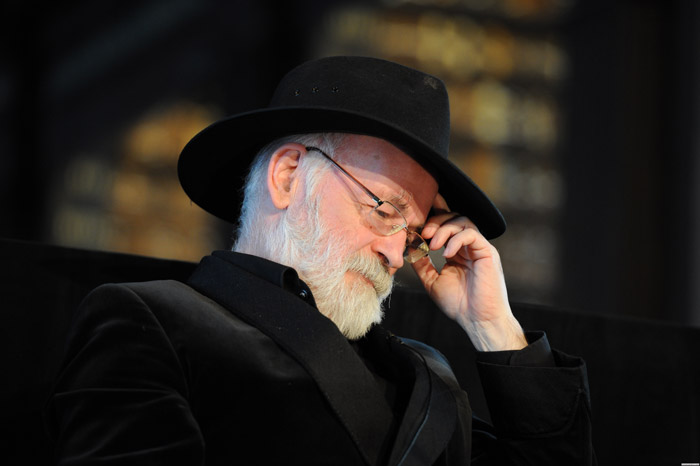
Last night, bibliophiles of all ages streamed into the Trinity Long Room Hub to immerse themselves in the bizarre imagination of Terry Pratchett. The corridor leading to the lecture theatre was filled with the recorded voice of Pratchett’s personal assistant, Rob Wilkins, as he read out a lecture of Pratchett’s, entitled “The Importance of Being Absolutely Amazed About Everything”. Pratchett originally gave the lecture in November 2010 when taking the role as Adjunct Professor here at Trinity. Pratchett’s unique sense of humour pervaded Trinity’s Public Theatre that day, and it did so once again last night, with his words playing in the background as the crowds eagerly filled the lecture hall.
“Terry Pratchett at the Unseen University” seamlessly brought together strands of research from the School of English, the ADAPT Centre in the School of Computer Science and the Alzheimer Society of Ireland. The event proved to be a far more popular choice for those enjoying Culture Night 2018 than its organisers anticipated, with James Hadley, from the Trinity Centre for Literary and Cultural Translation, exclaiming: “We were not expecting so many people!”
With posters bearing Pratchett’s most iconic quotes as the backdrop, representatives from the school of computer science and digital humanities kicked off the evening’s proceedings. Despite their worry that their research may “suck the fun out of things”, Séamus Lawless and Gary Munnelly allowed humour and a love of Pratchett’s Discworld series to take centre stage. Displaying “wordles”, images that represent the words Pratchett used most throughout the series, the speakers summarised the sheer brilliance of his writing and showcased the complexity of the author’s imagination through a computer-generated map of Discworld, the fantasy world of Pratchett’s creation. This feat of technological engineering was met with applause, with many people eagerly requesting that the map be made available to experience alongside their favourite texts.
Prof Jane Carroll followed, with her focus on Pratchett’s love of writing for a young audience filling the room with an air of nostalgia. Carroll made the point that Pratchett’s representation of children was unapologetically honest, as he once famously stated that “real children do not go hoppity skip unless they are on drugs”. For Carroll, this sense of reality makes Pratchett’s books even more “authentically engaging and interesting”. Pratchett used his children’s books to write about what he couldn’t in adult fiction. He tackled the importance of the home, for example, throughout his Tiffany Aching novels. One conclusion that the character Tiffany Aching comes to is that, each person is made up of everything that claims a place in our past. If this statement is true, Carroll said, “surely we are all a little bit of Terry Pratchett”, a suggestion that was met with enthusiastic nodding from everyone in the audience.
The atmosphere in the room changed as a representative from The Alzheimer Society of Ireland read out Pratchett’s reflections on his diagnosis. Describing his illness, posterior cortical atrophy (PCA), as a “wretched disease”, Pratchett wrote that he felt “totally alone” and it was only the support of his family and fans that made the diagnosis slightly less devastating. Although the revelation that he was suffering from such a rare form of early-onset dementia affected his life in so many ways, Pratchett wrote that all he had was his voice and that he had to make it heard. From this point until his death in 2015, he worked to raise awareness, donated $1,000,000 to the Alzheimer’s Research trust and contributed to lessening the stigma surrounding dementia.
Pratchett once famously said: “If you ignore the rules people will, half the time, quietly rewrite them so that they don’t apply to you”. Breaking the mould when it came to fantasy writing, Pratchett’s belief in the necessity to be true to oneself has endeared him to countless readers across many generations. Last night showcased Pratchett’s literary prowess, but the most striking aspect of the evening was the sense of community within the room. The audience’s laughter and eagerness to engage with the speakers was a testament to the strength of the community Pratchett created, something which has undoubtedly continued and grown since his untimely death.






